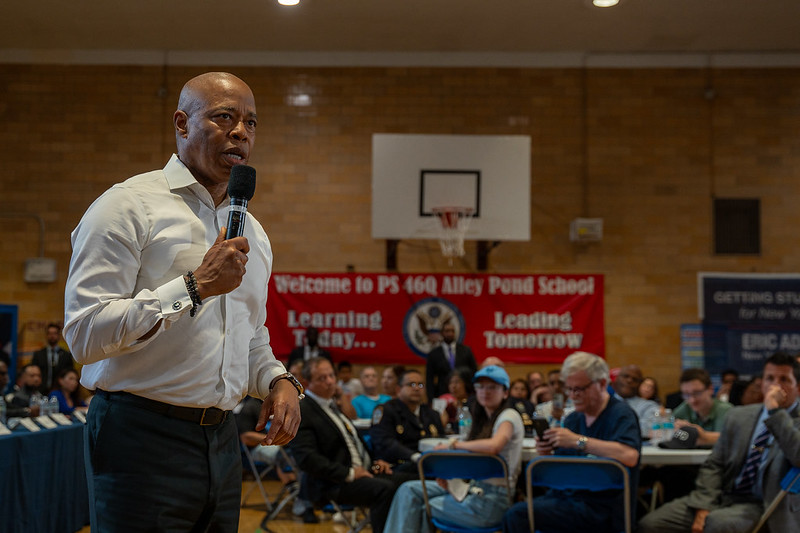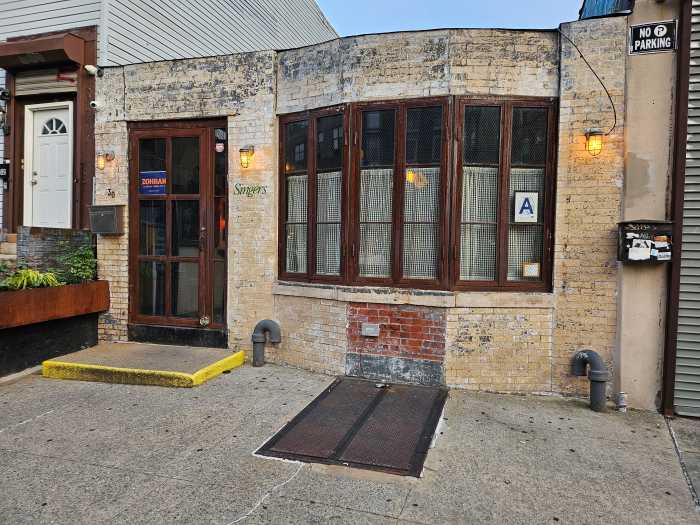By Julie Shapiro
A last-minute push by activists and the City Council last week did not dissuade the city from closing the Governors Island firehouse and cutting the hours of Engine 4 on South St.
Fire Commissioner Nicholas Scoppetta defended his decision at a City Council hearing Friday, saying the city needs to save money. The closure of the Governors Island firehouse and the nighttime closure of Engine 4 and three other fire companies in the city will save an estimated $8.9 million.
“I don’t think [anyone] wants to close fire companies,” Scoppetta said. “It is not a step we take lightly…. None of these are easy decisions — there’s a downside to all of this. You close a company, you lose something.”
The cuts took effect Sat., Jan. 17, but the four companies with nighttime closures will still occasionally be staffed from 6 p.m. to 9 a.m. Whenever the Fire Dept. has a surplus of 35 firefighters on the night shift, they will send the extra firefighters to the recently closed companies, Scoppetta said. The surplus will shrink over the next few months as firefighters retire and are not replaced.
Of the four companies with nighttime closures, Engine 4 is the lowest priority to staff temporarily with surplus firefighters, said Steve Ritea, an F.D.N.Y. spokesperson. Ladder 53 on City Island is the top priority and was staffed Sunday, Monday and Tuesday night. Engine 4 was staffed Sunday night but not Saturday, Monday or Tuesday. Ladder 15, which shares the firehouse, will remain open 24 hours a day.
Saturday also marked the closure of the three-person Governors Island firehouse, with no F.D.N.Y. presence scheduled for the immediate future. The island is currently closed to the public but construction is continuing throughout the winter, and the island has many historic wood-frame buildings. Security guards are on the island at all times.
Scoppetta said the F.D.N.Y. would have some staff on the island during large events, but he did not have any details for the Council on Friday. Ritea said later that Scoppetta would give his plan to the Council this week.
The 14 Governors Island firefighters had a choice between returning to their previous company or retiring, and nearly all opted to retire, said one island firefighter, who spoke to Downtown Express on condition of anonymity.
The firefighter had worked for the F.D.N.Y. for more than 22 years, just over the 20 needed for retirement.
“I knew it was inevitable,” he said of his decision to retire. “But it came sooner rather than later…. Probably, yeah, I would have stayed on.”
The retiring firefighters had only 45 days to plan for their retirement, which can take up to a year under normal circumstances, the firefighter said.
“It was kind of disrespectful,” the firefighter said, adding that many members of the Governors Island company survived the Trade Center. “We felt we could have used a little more notice.”
It wasn’t an emotional ending for the house, which opened in 2004, at least not on the surface.
“Everyone pretty much packed their bags and that’s it,” the firefighter said. “There wasn’t a ceremony.”
As the cuts drew closer at the end of last week, residents, elected officials and fire unions joined to oppose them.
“This is spit in Lower Manhattan’s face,” Lt. Edward Boles, treasurer of the Uniformed Fire Officers Association, told Community Board 1 Thursday night. “You’re facing a crisis here…. You pay taxes to the city. You deserve better.”
Boles spoke to the community board after attending a rally City Councilmember Alan Gerson organized in front of Engine 4. Waving signs and braving the cold, 30 people gathered to speak out against the closures, then many of them walked uptown to the community board meeting.
Boles told the board that the main function of engine companies is to respond to medical emergencies, and Engine 4 often responds several minutes before the first ambulance. Those minutes can make the difference between life and death for stroke and heart attack victims, Boles said.
After hearing Boles speak, the residents sounded concerned.
“This makes me sit here and say to myself, ‘Do I want to live here anymore?’” said Bruce Ehrmann, a Tribeca resident. “This is serious.”
At the City Council hearing the next day, several councilmembers asked Scoppetta to put the closures on hold for a few months, to give the Council time to help find a solution.
“We’re going ahead with the plan,” Scoppetta replied, “but that doesn’t mean we can’t communicate.”
The city’s economy hasn’t been this bad since the ’70s, Scoppetta said, and the F.D.N.Y. has already made cuts, including the elimination of 300 civilian positions since 2003.
Councilmember Gerson said Scoppetta’s justifications were not good enough.
“We’re playing Russian roulette with the safety of those who live and work in the Financial District,” Gerson said.
Gerson questioned why the city would close Engine 4, a company that just underwent decontamination training and received $1 million worth of counter-terrorism equipment, including a portable shower and hazmat suits. The equipment will remain in the firehouse on South St., and in an emergency, trained firefighters from Engine 205 in Brooklyn Heights would retrieve the equipment and respond, Scoppetta said.
When Gerson expressed concern that Engine 205 would not be able to get across the Brooklyn Bridge during an emergency, Scoppetta said the F.D.N.Y. would give decontamination training to Engine 6 or Engine 10 in Lower Manhattan.
“The fact [Engine 4] is trained as a decon unit is not a controlling factor of keeping them open,” Scoppetta said.
Gerson was also worried that the construction flooding Downtown’s streets will make it harder for fire trucks to get around, which could increase response times. Scoppetta replied that the F.D.N.Y. tracks response times to correct any negative trends, but he does not predict the impact of construction on future response times.
Also at the hearing, Councilmember James Oddo, from Staten Island, questioned whether the cuts would save the projected $8.9 million and asked to hear from the city Office of Management and Budget, which was not scheduled to testify. Several city staffers scurried off to make phone calls, then relayed the message to Oddo that the O.M.B. would not come. The O.M.B. thought the hearing was “not budget related,” Oddo said, prompting laughter from the otherwise somber audience.
Scoppetta stepped in and said the cuts will save money because they will add to the pool of unassigned, on-call firefighters, which will reduce the department’s use of overtime employees. The city will also save money on the salaries and fringe benefits of retiring firefighters, Scoppetta said.
” target=_blank>Julie@DowntownExpress.com
































